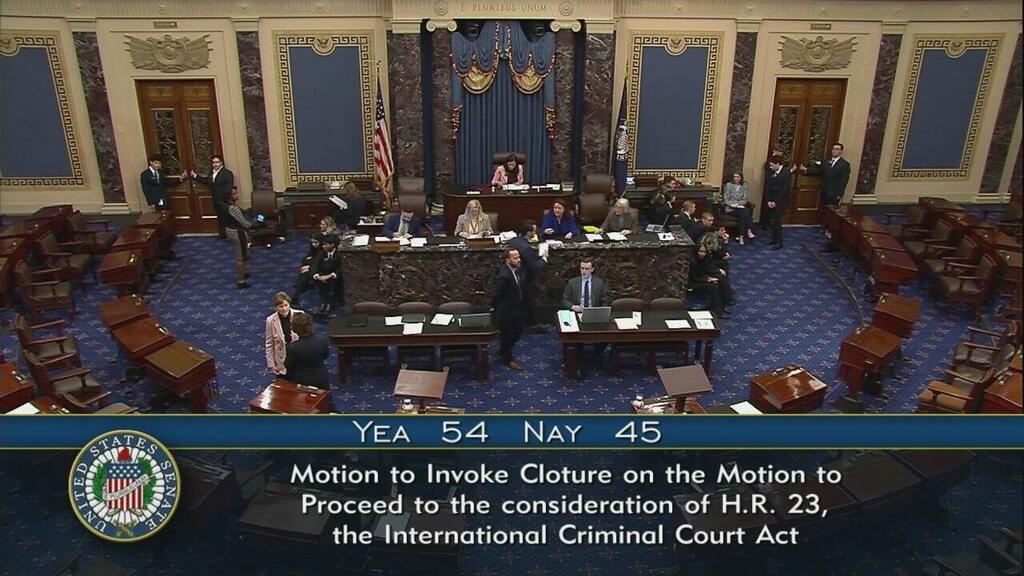Getting your Trinity Audio player ready...
Legislation that would have imposed sanctions on the International Criminal Court in protest of its arrest warrants for Prime Minister Benjamin Netanyahu and his former defense minister was voted down in the U.S. Senate on Tuesday.
Senate Democrats blocked the bill that was intended to severely punish the International Criminal Court in The Hague (ICC) for the arrest warrants it issued against Prime Minister Benjamin Netanyahu and former Defense Minister Yoav Gallant. The bill promoted by Republicans, to impose “crippling” sanctions against the court and against anyone involved in its investigations into Israel, received a majority of votes – 54 to 45 – but not the 60-member majority needed in the in the 100-member Senate to prevent a filibuster and allow the legislation to advance.
The vote was largely along party lines, with almost every Democrat and independent voting against it. Senator John Fetterman was the only Democrat to vote with Republicans to advance the measure. Democratic Senator Jon Ossoff did not vote. Republicans have a 53-member majority in the Senate.
In an interview with The Washington Post before the vote, Fetterman said he wanted the "strongest version" of sanctions on The Hague: "I'm going to vote for it, I don't understand how anyone could not vote for sanctions against the ICC, after how they've treated Israel."
The "Illegitimate Court Counteraction Act" would have imposed sanctions on any foreigner who investigates, arrests, detains, or prosecutes U.S. citizens or those of an allied country, including Israel, who are not members of the court.
Get the Ynetnews app on your smartphone: Google Play: https://bit.ly/4eJ37pE | Apple App Store: https://bit.ly/3ZL7iNv
It passed the House earlier this month 243-140, as 45 Democrats joined Republicans in voting "yes."
In the Senate, Democrats said they agreed with much of the bill, but said it was too broad and risked alienating important U.S. allies and imposing sanctions on lower level workers at the court in the Netherlands.
Urging colleagues to vote "no," Senate Democratic Leader Chuck Schumer, who is Jewish, accused the ICC of having "an anti-Israel bias that cannot be ignored." However, he said the bill was poorly crafted and also could target U.S. companies, such as those whose products help protect the court from foreign hackers.
Although it seems like a setback for Israel's efforts to act against the ICC, officials in Jerusalem say that discussions in Washington regarding the proposal's wording are ongoing. There is a possibility that the proposal may resurface later, potentially in a more softened form.
Republican Senator Tom Cotton of Arkansas, who signed the bill, accused Democrats after the vote of poor negotiating practices on the text. “Democrats had 10 months to negotiate this bill, but instead they waited until the last minute to demand unworkable changes,” he said, claiming that Democrats want to grant significant relief to tech companies.
"Democrats voted against protecting American forces against a court-martial," Cotton accused - referring to the Republicans' claim that the arrest warrants against senior Israeli officials constitute a dangerous precedent that could also threaten future soldiers and senior officials in the United States, which, like Israel, is not a member of the court and does not recognize its authority. "Make no mistake: Democrats today weakened our national security and Israel's ability to defend itself."
The drafters of the law state in the proposal that Prosecutor Karim Khan 's accusations against Israel, alleging war crimes and attempts to starve civilians in Gaza, are "baseless and illegitimate." The proposal also states that the arrest warrants issued by the ICC judges constitute a "dangerous precedent" that threatens the US, Israel, and other allies that do not recognize the authority of the court, which was established in 2002 under the Rome Statute.
3 View gallery


Sen. John Fetterman with President Isaac Herzog on a visit to Israel
( Photo: Maayan Toaf, GPO)
Israel never signed the treaty, but in 2021 the court's judges ruled that it had jurisdiction over what was happening in the Palestinian territories because the Palestinian Authority had joined the treaty. An investigation into suspected war crimes against Israel had already been opened at that time, and it was expanded following the events of the war. The prosecutor who requested the arrest warrants, Khan, is currently embroiled in an investigation into allegations of sexual harassment .
In recent days, Western diplomats and human rights organizations have warned of the implications of the bill, arguing that sanctions on the ICC would harm efforts to prevent war crimes around the world – and also the court’s investigations into Russia following the war in Ukraine. The court also issued an arrest warrant for Russian President Vladimir Putin.
In a letter sent by 20 European diplomats to senior Senate officials, they warned that the proposed sanctions “threaten to erode the rule of international law, which is critical in promoting order and security in the world.” According to them, “such steps would undermine the very principle of international justice and accountability – a principle of which the United States has been a strong advocate.”



